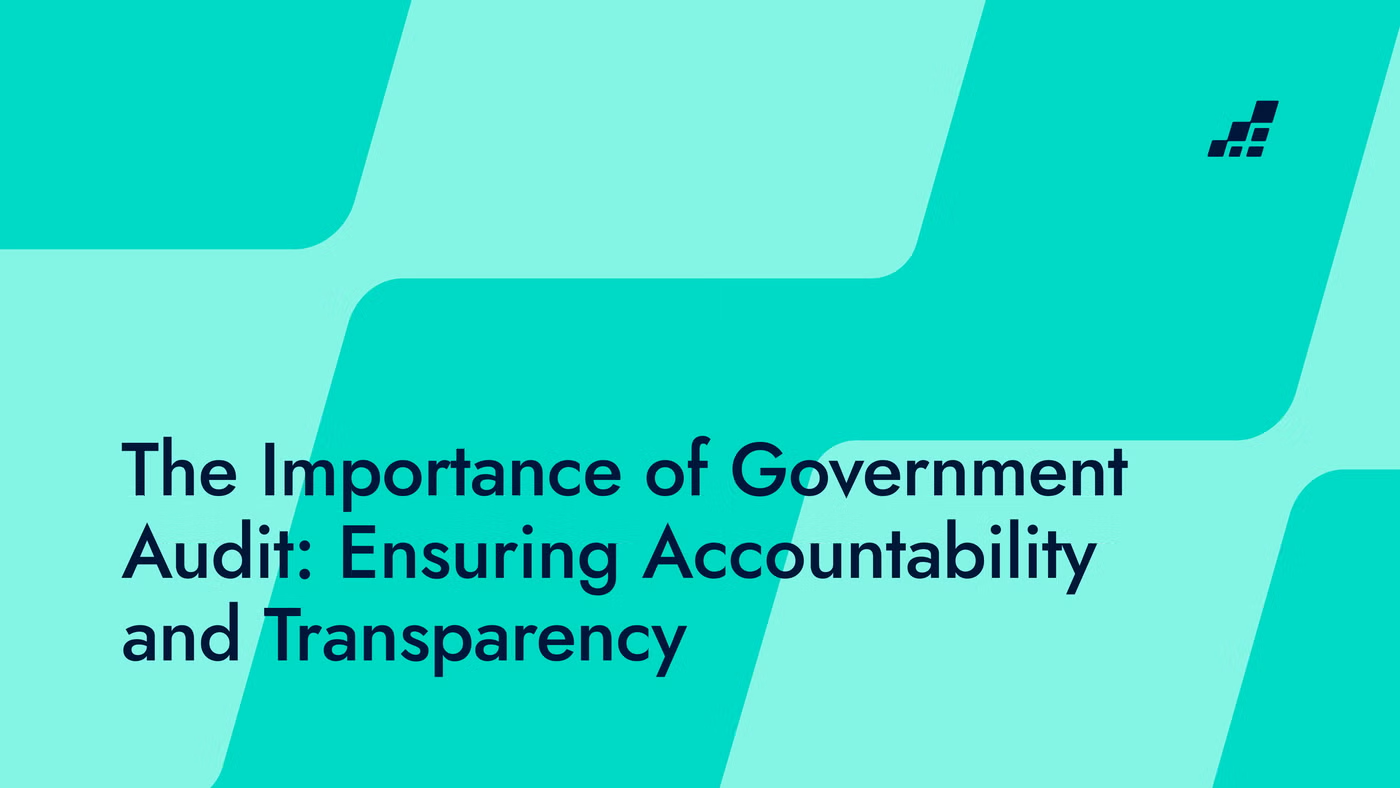- /
- Blog
The Importance of Government Audit: Ensuring Accountability and Transparency

Government audit plays a crucial role in upholding accountability and transparency within the public sector. By examining financial records, operations, and compliance with regulations, auditors provide an independent assessment of government agencies and programs.
This article will delve into the significance of government audits, their process, their impact on accountability, and their role in ensuring transparency. Additionally, it will touch upon some challenges that arise in government auditing and their implications.
Understanding Government Audits
Definition and Purpose of Government Audits
Government audits, conducted by qualified professionals, ensure the accuracy and reliability of financial statements, internal controls, and the use of public funds. They play a very important role in maintaining the integrity, trust, and accountability of government entities.
Financial Statements
When dealing with financial statements, government audits carefully examine all the numbers and figures to make sure they're free from material misstatements. This enables auditors to provide an independent and objective opinion on the fairness and accuracy of the financial statements - which, of course, is vital.
Internal Controls
Internal controls form a critical part of government audits. Auditors evaluate the effectiveness of these internal controls in safeguarding assets, preventing fraud, and ensuring compliance with laws & regulations.
This review encompasses policies, procedures, and practices to identify any weaknesses or deficiencies that may pose risks to the organization.
Public Funds
In government audits, there's a keen focus on the utilization of public funds. Auditors delve into how government entities allocate and spend taxpayer money, making sure it's done in a lawful and responsible manner. They evaluate whether the funds align with their intended purposes and if the expenditures are reasonable and justified.
The main purpose of these audits is to ensure that governments and government entities operate in an efficient, effective, lawful, and transparent manner.
By providing an independent assessment, government audits help maintain public trust and confidence in their ability to manage public resources - in layman's terms, it's pretty important.
The Role of Auditors in Government Accountability
The role of auditors in government accountability is probably exactly what you imagine.
One of the key responsibilities is to provide an independent assessment of government agencies and programs. Auditors help identify areas of weakness, inefficiency, or non-compliance via thorough examinations of financial records, operations, and internal controls.
Their findings and recommendations contribute to the improvement of government operations and the overall effectiveness of public services.
Holding Government Officials Responsible for Their Actions
Auditors provide an objective evaluation of the performance and actions of governments and government entities. If any irregularities or misconduct do crop up, auditors have the obligation to report them and ensure that appropriate actions are taken.
Representing the Public
Auditors represent the citizens through their independent and unbiased assessments. Auditors report their findings to government officials, legislators, and the general public. This transparency helps to promote trust and confidence in the government's capacity to manage public resources honestly, effectively, and responsibly.
The Process of Government Audits
The process of conducting a government audit involves several stages, each with its own significance and purpose.
Planning and Preparation
Before auditors dive into their work, they embark on a careful planning and preparation phase. This step is crucial to ensure a deep understanding of the entity or program under audit, involving a thorough review of relevant laws, regulations, and policies governing its operations.
Pinpointing Potential Risks
During this planning phase, auditors pinpoint potential risk areas and identify issues needing attention throughout the audit. This strategic approach allows them to concentrate efforts where the impact is likely to be significant or attention is required. Through a comprehensive risk assessment, auditors prioritize tasks and allocate resources efficiently.
Establishing Clear Objectives
On top of this, auditors establish clear objectives for the audit. They craft an audit plan that outlines the scope, methodology, and timeline. This plan serves as a roadmap for the entire audit process, ensuring auditors stay on track and meet their objectives.
Execution and Reporting
Once the planning phase is complete, auditors move on to the execution stage of the audit– this is where the fun begins. Auditors conduct fieldwork, which involves visiting the audited entity's premises, examining records, and gathering evidence.
Out in the Field
While out in the field, auditors perform various tests to assess the effectiveness of internal controls, compliance with laws and regulations, and the accuracy of financial statements. Auditors analyze documents and data, looking for any anomalies or irregularities that may indicate potential fraud or mismanagement.
Interview with an Official
In addition to examining records, auditors sometimes conduct interviews with officials, employees, and stakeholders. These interviews provide valuable insights into operations, challenges, and potential areas for improvement.
Compiling a Comprehensive Report
After the audit fieldwork, auditors gather their findings, conclusions, and recommendations and put them into a report.
The report is comprehensive and is the final product of the audit. It provides an objective assessment of the audited entity's performance, compliance, and financial management.
Shared with Stakeholders
The report is then shared with the audited entity and relevant stakeholders, such as government officials, oversight bodies, and the public. It serves as a tool for accountability and transparency, highlighting areas of strength and weakness and providing recommendations for improvement.
The Impact of Government Audits on Accountability
Promoting Financial Responsibility
Government audits play a vital role in promoting financial responsibility within public agencies. By examining the use of public funds, auditors help identify instances of wasteful spending, mismanagement, or improper allocation of resources.
The transparency and accountability fostered by these audits encourage government entities to make sound financial decisions and be more responsible custodians of public money.
Detecting and Preventing Fraud
Government audits also help to detect and prevent fraud. They reduce the risk of corruption, safeguard public resources, and ensure that public officials and employees adhere to ethical standards.
Auditors uncover fraudulent activities or irregularities by assessing internal controls and examining financial transactions.
The Role of Government Audits in Ensuring Transparency
Enhancing Public Trust
By providing an unbiased assessment of government activities, government audits reassure citizens that public agencies are operating in their best interest.
The transparency and accountability demonstrated through audits build public confidence and create a sense of trust in government institutions.
Facilitating Informed Decision-Making
Government audits provide decision-makers with reliable and accurate information about the performance of government programs and agencies. The insights gained from these audits enable policymakers to allocate resources effectively and improve public service delivery.
By evaluating the efficiency and effectiveness of policies and operations, audits help policymakers make informed decisions that can lead to positive outcomes for the public.
Challenges in Government Auditing
Political Interference in Auditing
One of the significant challenges faced by government auditors is political interference. In some instances, the independence and objectivity of audits may be compromised due to pressures from politicians or influential individuals.
This interference hampers the effectiveness of audits and can undermine accountability and transparency within government entities.
Limited Resources and Capacity
Government audits often face constraints in terms of resources and capacity. Limited funding, staffing shortages, or inadequate technological infrastructure can hinder the efficiency and effectiveness of audits.
These challenges highlight the need for continued investment in audit institutions and the allocation of sufficient resources to carry out comprehensive and impactful audits.
–
Government audits are vital for ensuring accountability and transparency within public sector organizations. Through their rigorous examination of financial records, operations, and compliance, auditors contribute to promoting financial responsibility, detecting and preventing fraud, enhancing public trust, and facilitating informed decision-making.
Nevertheless, challenges such as political interference and limited resources need to be addressed to strengthen the effectiveness of government audits and further uphold accountability and transparency.
Government Audits with DataSnipper
Securely conduct Government Audits with our Intelligent Automation Platform. Shorten review times, focus more on high-risk areas, and create easy-to-review audit reports in Excel.

